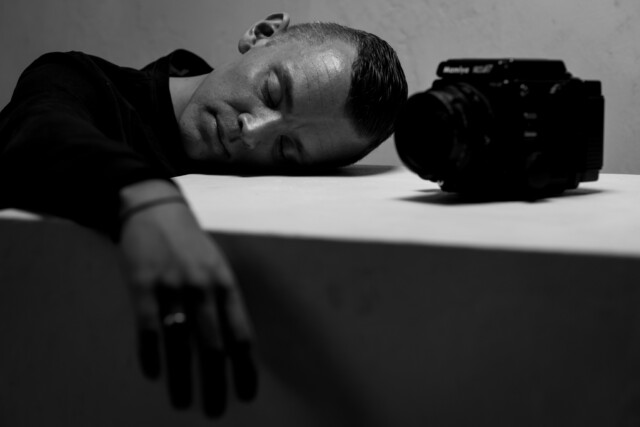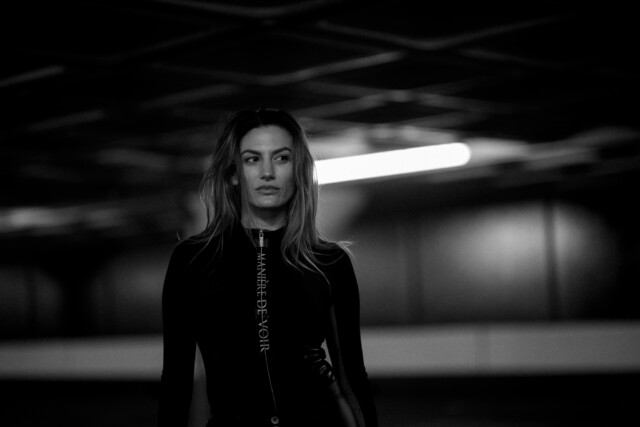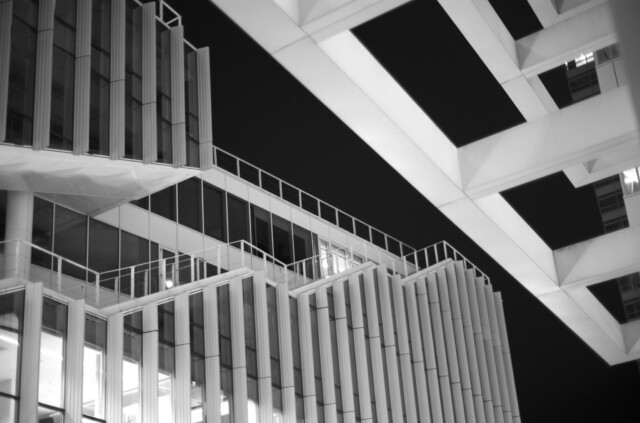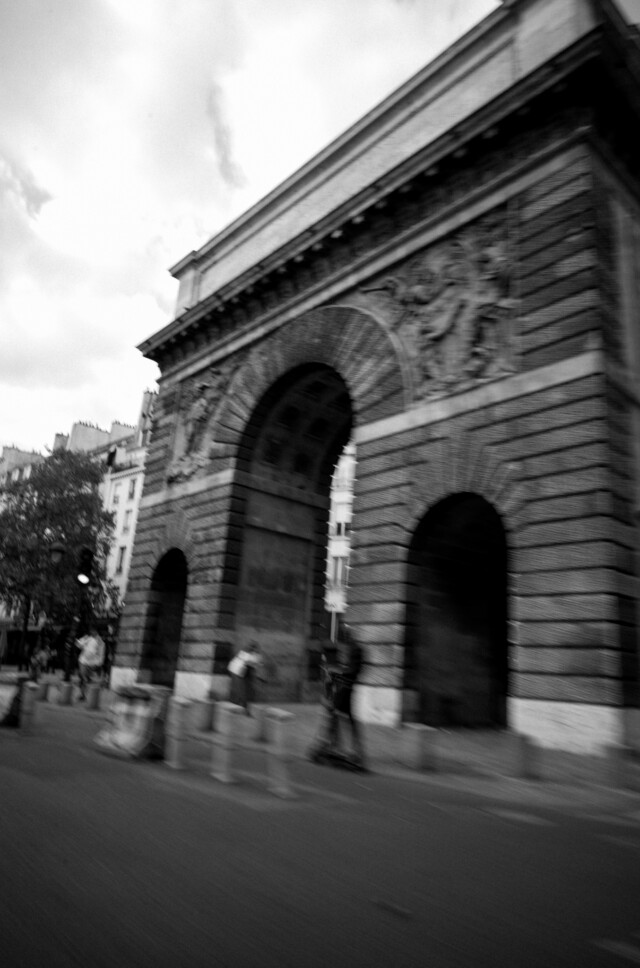Archive One
Out Now · Digital + 6LP Boxset
Archive One
Out Now · Digital + 6LP Boxset
Biography
Dave Clarke was born and raised in Brighton, England, but currently resides in Amsterdam, a city which revitalised his life and work. The offspring of a technology loving father and a disco-soul loving mother, it was always evident that Clarke would cut a swathe through music. As a youth he ran away from home, sleeping in car parks and on beaches. He took lousy jobs in shoe shops, living off £5 a day, to subsidise his income from badly paid local DJ gigs – anything to further his involvement with music.
“I didn’t really engage at all with the outside world,” he recalls, “I was your typical disenfranchised JD Salinger-inspired young adult that used to hide in and behind music.”
Clarke’s debut release was in 1990 on XL. He used the name Hardcore, a guise he then took to the legendary Belgian techno-rave imprint R&S where he released various EPs (some as Directional Force). By 1992 Clarke’s own label, Magnetic North, was on the rise and he unveiled the classic ‘Alkaline 3dh’ (as Fly By Wire), among others. A next level career boost was round the corner when his ‘Red’ trilogy were unleashed on Bush Records in 1994. These catapulted Clarke into a different league and he suddenly found himself remixing the likes of Kevin Saunderson’s Inner City, The Chemical Brothers, New Order, Depeche Mode, Moby, Leftfield and Underworld. Undisputed landmarks in techno, DJ Mag rightly incorporated ‘Red’ in its All Time Techno Top 100 list.
Clarke’s debut album ‘Archive One’ followed, flecked with hints of breakbeat and electronica, a novelty in the puritanical techno scene of the time. Clarke’s mix CDs include the techno/electro double ‘World Service’ outings, one of which sold nearly 100,000 and made it into Resident Advisor’s top ten mix compilations of the 21st century. He signed to Skint Records – resulting in 2004’s ‘Devil’s Advocate’ album, jammed with dark techno energy but laced with hip hop beats. When his production pace ebbed, Music Man Records gathered together ‘Remixes & Rarities’ in 2007, making Album Of The Month in Mixmag and receiving critical plaudits all over.
After a break from production, recent years saw Clarke make his presence felt again, working with Dutch partner Mr Jones (Jonas Uittenbosch) as _Unsubscribe_ and dropping remixes ranging from John Foxx’s seminal synth-pop gem ‘Underpass’ to Gesaffelstein, Detroit Grand Pubas and Octave One, as well cutting tracks for labels such as Houndstooth and Boysnoize. In 2016 an album of remixes, ‘Charcoal Eyes (A Selection of Remixes From Amsterdam)’, ranging from Placebo to A Place to Bury Strangers, suggested Clarke was revitalized in the studio.
Nothing says this as potently as his last album, ‘The Desecration of Desire’. Electronic to the hilt yet full of rich, dark songwriting, featuring many guest artists including Mark Lanegan, it took almost two years to make and came 14 years after his last full-length outing.
As a DJ, Clarke plays out three weekends a month (before Corona) across Europe and the world, living up to his nickname, the Baron of Techno, a moniker given him by the late, great BBC Radio DJ John Peel. There’s the same attention to detail each time, his sets swooping whip-smart along the cutting blade of techno and electro, backed up by a seasoned bag of DJ tricks in which his early hip hop roots clearly show. Techno’s first and original “Man in Black”, Clarke blends into the background upon arrival and lets his music do the talking. That’s where he comes alive, where skills honed for years blow venues apart.
And then there are his radio shows. White Noise, which is almost up to its 850th episode, a global institution and an indicator of where the true underground scene is heading, broadcast on over 100 FM radio stations worldwide weekly, and his newest venture on RTE 2fm that he started called The Saga (inspired by his decade long love affair with Iceland) which allows Clarke to delve into his non dance music collection and be utterly leftfield and tip his hat to artists you might not be aware of that he admires.
In 2019, Dave worked with the violinist Mathilde Marsal on Variations, a project which was filmed live in front of an audience at Charles De Gaulle airport for national French television, an honour driven by his first passionate foray into Classical Music by Gustav Holst. A young Clarke would listen to the Planet Suite with amazement (including the Tomita version) on his father’s hefty Tannoy sound system and although Dave had been offered the opportunity to work in other settings and with other orchestras, Dave felt that it had to be the right collaboration in order to do it justice. 2020 saw Dave and Mathilde invited to Le Grand Échiquier, a grand French National institution that is almost 50 years old, to perform with the Paris Opera Orchestra for France 2 Television attracting an audience of between 2 and 3 million viewers. Dave was the very first electronic artist to be invited to this programme.
More recently, Dave has stepped into the world of photography and in 2021 he scored his first front covers, including one for Billboard magazine. 2021 was supposed to be a time when Dave first would hold his exhibition, but like the rest of the artistic world, he is waiting for a more suitable moment.
The pandemic has, however, allowed Dave to spend more time in the studio working on a new project with Mathilde Marsal, amongst a number of other collaborations, most notably Dave’s remix of Mercury Prize and Grammy nominated Fontaines DC’s ‘Televised Mind’, which scored the pairing a number one in the UK’s Official Vinyl Singles Chart. Dave also mixed the new album for esoteric Belgian band De Portables, adding another string to his bow.
In short, Dave Clarke might be established, but he will never be establishment.
Biography
Dave Clarke was born and raised in Brighton, England, but currently resides in Amsterdam, a city which revitalised his life and work. The offspring of a technology loving father and a disco-soul loving mother, it was always evident that Clarke would cut a swathe through music. As a youth he ran away from home, sleeping in car parks and on beaches. He took lousy jobs in shoe shops, living off £5 a day, to subsidise his income from badly paid local DJ gigs – anything to further his involvement with music.
“I didn’t really engage at all with the outside world,” he recalls, “I was your typical disenfranchised JD Salinger-inspired young adult that used to hide in and behind music.”
Clarke’s debut release was in 1990 on XL. He used the name Hardcore, a guise he then took to the legendary Belgian techno-rave imprint R&S where he released various EPs (some as Directional Force). By 1992 Clarke’s own label, Magnetic North, was on the rise and he unveiled the classic ‘Alkaline 3dh’ (as Fly By Wire), among others. A next level career boost was round the corner when his ‘Red’ trilogy were unleashed on Bush Records in 1994. These catapulted Clarke into a different league and he suddenly found himself remixing the likes of Kevin Saunderson’s Inner City, The Chemical Brothers, New Order, Depeche Mode, Moby, Leftfield and Underworld. Undisputed landmarks in techno, DJ Mag rightly incorporated ‘Red’ in its All Time Techno Top 100 list.
Clarke’s debut album ‘Archive One’ followed, flecked with hints of breakbeat and electronica, a novelty in the puritanical techno scene of the time. Clarke’s mix CDs include the techno/electro double ‘World Service’ outings, one of which sold nearly 100,000 and made it into Resident Advisor’s top ten mix compilations of the 21st century. He signed to Skint Records – resulting in 2004’s ‘Devil’s Advocate’ album, jammed with dark techno energy but laced with hip hop beats. When his production pace ebbed, Music Man Records gathered together ‘Remixes & Rarities’ in 2007, making Album Of The Month in Mixmag and receiving critical plaudits all over.
After a break from production, recent years saw Clarke make his presence felt again, working with Dutch partner Mr Jones (Jonas Uittenbosch) as _Unsubscribe_ and dropping remixes ranging from John Foxx’s seminal synth-pop gem ‘Underpass’ to Gesaffelstein, Detroit Grand Pubas and Octave One, as well cutting tracks for labels such as Houndstooth and Boysnoize. In 2016 an album of remixes, ‘Charcoal Eyes (A Selection of Remixes From Amsterdam)’, ranging from Placebo to A Place to Bury Strangers, suggested Clarke was revitalized in the studio.
Nothing says this as potently as his last album, ‘The Desecration of Desire’. Electronic to the hilt yet full of rich, dark songwriting, featuring many guest artists including Mark Lanegan, it took almost two years to make and came 14 years after his last full-length outing.
As a DJ, Clarke plays out three weekends a month (before Corona) across Europe and the world, living up to his nickname, the Baron of Techno, a moniker given him by the late, great BBC Radio DJ John Peel. There’s the same attention to detail each time, his sets swooping whip-smart along the cutting blade of techno and electro, backed up by a seasoned bag of DJ tricks in which his early hip hop roots clearly show. Techno’s first and original “Man in Black”, Clarke blends into the background upon arrival and lets his music do the talking. That’s where he comes alive, where skills honed for years blow venues apart.
And then there are his radio shows. White Noise, which is almost up to its 850th episode, a global institution and an indicator of where the true underground scene is heading, broadcast on over 100 FM radio stations worldwide weekly, and his newest venture on RTE 2fm that he started called The Saga (inspired by his decade long love affair with Iceland) which allows Clarke to delve into his non dance music collection and be utterly leftfield and tip his hat to artists you might not be aware of that he admires.
In 2019, Dave worked with the violinist Mathilde Marsal on Variations, a project which was filmed live in front of an audience at Charles De Gaulle airport for national French television, an honour driven by his first passionate foray into Classical Music by Gustav Holst. A young Clarke would listen to the Planet Suite with amazement (including the Tomita version) on his father’s hefty Tannoy sound system and although Dave had been offered the opportunity to work in other settings and with other orchestras, Dave felt that it had to be the right collaboration in order to do it justice. 2020 saw Dave and Mathilde invited to Le Grand Échiquier, a grand French National institution that is almost 50 years old, to perform with the Paris Opera Orchestra for France 2 Television attracting an audience of between 2 and 3 million viewers. Dave was the very first electronic artist to be invited to this programme.
More recently, Dave has stepped into the world of photography and in 2021 he scored his first front covers, including one for Billboard magazine. 2021 was supposed to be a time when Dave first would hold his exhibition, but like the rest of the artistic world, he is waiting for a more suitable moment.
The pandemic has, however, allowed Dave to spend more time in the studio working on a new project with Mathilde Marsal, amongst a number of other collaborations, most notably Dave’s remix of Mercury Prize and Grammy nominated Fontaines DC’s ‘Televised Mind’, which scored the pairing a number one in the UK’s Official Vinyl Singles Chart. Dave also mixed the new album for esoteric Belgian band De Portables, adding another string to his bow.
In short, Dave Clarke might be established, but he will never be establishment.
























